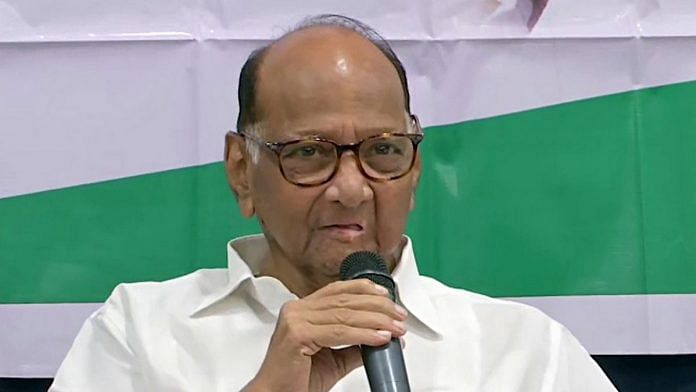Mumbai: In the 2014 assembly elections, the Bharatiya Janata Party (BJP) and Shiv Sena dominated the Congress-Nationalist Congress Party’s (NCP) turf of western Maharashtra, sapping the opposition’s strength in this Maratha-dominated belt.
In five years, the tables have turned with the Congress and the NCP having regained much of their space in the region, mostly at the cost of the Shiv Sena.
The western Maharashtra region is spread across five districts — Pune, Sangli, Satara, Solapur and Kolhapur — and it accounts for 58 of the state’s 288 assembly constituencies.
The results in this region were affected by several factors — NCP president Sharad Pawar’s aggressive campaigning and a sympathy wave for him in his home turf, a split in the Maratha votes between the BJP and the NCP, anger against the ruling parties in Kolhapur and Sangli districts, which battled severe floods just two months ago, and BJP-Shiv Sena rebels having cut the alliance’s votes.
According to the latest trends, the Congress and the NCP together are leading in 31 seats, with the NCP ahead in 21 seats and the Congress in 10. In the 2014 assembly election, the two parties’ presence in the region was reduced to just 16 and 7, respectively, while the BJP and Shiv Sena together picked up 31 seats.
This time, while the BJP’s tally is likely to be 18 as against 19 the last time, the Shiv Sena’s numbers may plummet to just four from 12 in 2014, according to the trends.
The Maratha vote
The Maratha vote is perhaps the most dominant in western Maharashtra, and over the years, the community has mostly rallied with the Congress and the NCP.
In 2014, a number of these voters went to the BJP amid extreme anti-incumbency against the Congress-NCP government and a huge ‘Modi wave’.
However, over the next few years, the community staged a series of protests against the Devendra Fadnavis-led government, first silent and later violent, demanding reservations in government jobs and education.
Earlier this year, the Fadnavis government earned the community’s support by creating 12 per cent reservation for them in education and 13 per cent quota in government jobs, and ensuring it withstands judicial scrutiny. This earned the BJP bragging rights against the opposition, which during its tenure failed to create a reservation that could withstand the court’s scrutiny.
“This time, the Maratha vote from western Maharashtra was evidently split between the BJP and the NCP,” said Rajendra Kondhare from Maratha Mahasangh.
“Many Maratha voters went with the BJP after the government created the Maratha quota. However, a large section also swivelled back to the NCP simply because of Sharad Pawar, especially in the last leg of campaigning for the assembly election,” he added.
Kondhare added there was immense sympathy wave among western Maharashtra voters for the NCP supremo after it seemed that the BJP was unnecessarily targeting the leader with a money laundering case in connection with irregularities in the functioning of Maharashtra State Cooperative Bank.
Pawar was neither a director nor a functionary of the bank, unlike the others named in the case. Pawar’s rain-soaked address in Satara district when he refused to call off his rally despite getting drenched just because the crowd was also standing in the rain, listening to him, also impressed voters, Kondhare said.
While the Shiv Sena had also projected itself as a party whole-heartedly supporting the Marathas in their quota quest, leaders in western Maharashtra said, it was one untimely cartoon published in the party’s mouthpiece, Saamana, in 2016, that ruined its prospects of getting Maratha votes.
Saamana had published a caricature, playing on the word “muk morcha” (silent protests) of the Marathas, and twisted them to “muka morcha” (kissing protest) — thus angering the Maratha community.
Also read: ‘Maratha warrior’ Sharad Pawar shows why he still matters in Maharashtra politics
Anger over ‘bungled’ flood relief operations
Kolhapur and Sangli, which were ravaged by floods in August, were incidentally the two districts with the highest voter turnout figures this election in Maharashtra.
With most of the seats in the region falling in the Shiv Sena’s quota, the party seems to have faced the impact of the wrath of the people over the government’s alleged mishandling of flood relief operations.
Of the six seats that the party had in Kolhapur, the Sena could retain only one this time. Similarly in Sangli, the BJP is set to lose two of the four seats it won in 2014.
“To some extent, flood relief may have caused anti-incumbency because it is not possible to satisfy everyone with answers. The government tried to do the best possible (work), but the loss was so huge that any government would have to face some resentment by people,” said Sena MP Dhairyasheel Mane.
Mane said more than the anger over flood management, it is rebel candidates of the BJP that hurt the Sena’s prospects.
“A number of BJP rebels fought against official Shiv Sena candidates in seats such as Shirol, Shahuwadi, Hatkanangale, and Sena rebels, too, may have hurt the BJP’s performance in some seats. The two parties should have managed their workers in a better manner to avoid this situation,” he added.
Also read: Maharashtra, Haryana send a message against the BJP’s arrogance of power




According to some psephologists, Prakash Ambedkar has harmed the Congress – NCP in 23 seats, without winning a single one for his front.